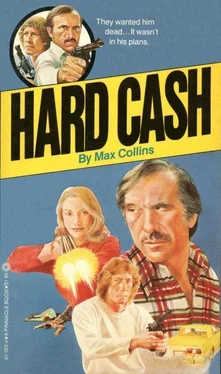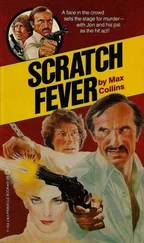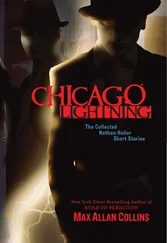Max Collins - Hard Cash
Здесь есть возможность читать онлайн «Max Collins - Hard Cash» весь текст электронной книги совершенно бесплатно (целиком полную версию без сокращений). В некоторых случаях можно слушать аудио, скачать через торрент в формате fb2 и присутствует краткое содержание. Город: New York, Год выпуска: 1982, ISBN: 1982, Издательство: Pinnacle Books, Жанр: Криминальный детектив, на английском языке. Описание произведения, (предисловие) а так же отзывы посетителей доступны на портале библиотеки ЛибКат.
- Название:Hard Cash
- Автор:
- Издательство:Pinnacle Books
- Жанр:
- Год:1982
- Город:New York
- ISBN:9780523411637
- Рейтинг книги:3 / 5. Голосов: 1
-
Избранное:Добавить в избранное
- Отзывы:
-
Ваша оценка:
- 60
- 1
- 2
- 3
- 4
- 5
Hard Cash: краткое содержание, описание и аннотация
Предлагаем к чтению аннотацию, описание, краткое содержание или предисловие (зависит от того, что написал сам автор книги «Hard Cash»). Если вы не нашли необходимую информацию о книге — напишите в комментариях, мы постараемся отыскать её.
Hard Cash — читать онлайн бесплатно полную книгу (весь текст) целиком
Ниже представлен текст книги, разбитый по страницам. Система сохранения места последней прочитанной страницы, позволяет с удобством читать онлайн бесплатно книгу «Hard Cash», без необходимости каждый раз заново искать на чём Вы остановились. Поставьте закладку, и сможете в любой момент перейти на страницу, на которой закончили чтение.
Интервал:
Закладка:
“No? Why not?”
“Because,” Nolan said, leaning forward himself now, returning the smile, whispering, “when you leave here, a friend of mine is going to shoot you, toss you in the trunk of his car, and dump you in a ravine.” And he leaned back and stopped smiling.
A tic got going at the left edge of the man’s right eye, and they were gray eyes, not blue, Nolan decided.
“I... don’t believe you.”
Nolan shrugged again, this time with his shoulders. “Do what you want. All I know is I saw you come in, twenty minutes ago. You sat down and started staring at me. I left the room, used the phone. My friend’ll be outside now. And there’s only the one exit, you know.”
All of that was bullshit, but the man didn’t know it. There had been no phone call. Nolan had left the room — to go up to his office and get a .38 snub out of a desk drawer. The gun was stuck in his belt, under his sport coat, but he of course had no intention of using the thing in a public place like this, even if it was a slow night. And the only friend he had in town who could conceivably help him was Jon, who was as unlikely an assassin as Nolan could think of. Even the bit about the exit was crap: there were three, as a matter of fact.
Not that Nolan wouldn’t kill this man if he had to. And he was starting to think maybe that’d be the case.
Nolan was fifty years old and did not look it, particularly, though at times like this he certainly felt it. He was a big but not huge man, lean but deceptively muscular with a slight paunch one of the few visible signs of his middle age. His hair was dark, slightly shaggy, widow’s peaked, graying at the temples; he had had the permanently dour countenance of a western gunfighter and the thick, slightly droopy moustache to go with it; at the same time he had high cheekbones and narrow eyes somehow suggestive of an American Indian. It was as if somewhere in his ancestry there’d been a Cochise and Doc Holliday both.
He was a professional thief, recently retired but with no pretense of having at last joined the “straight” world. He had been a thief too long to ever think of himself as anything else, and he’d be fooling himself if he tried. He had heard a supposedly true story about a guy named Levitz, who was a very smooth, very successful con man back in the thirties, but who had a complex about being Jewish. One day Levitz was walking down the street with another successful con artist of the era, a hunchback named Lange, and as they went by a synagogue, Levitz said, “Did you know I used to be a Jew?” And Lange said, “Did you know I used to be a hunchback?”
Nolan knew better than to try and con himself; he was a thief and had no pretensions otherwise. Besides, the money he had invested in the Pier was heist money mostly, and if you’re going to build a new, socially acceptable life for yourself on that kind of money, you’re wise never to forget where the foundation came from.
Because forgetting who you were — who you are — could be dangerous as hell.
Take this situation, for instance.
The man in the pinstripe suit, sitting across the table from Nolan, was the president of a bank: the First National Bank of Port City, Iowa, a town of twenty thousand just forty miles southeast of Iowa City. The man’s name was George Rigley. A little over two years ago, the two men had sat across from each other in a similar manner. At George Rigley’s desk. In George Rigley’s bank.
Two years and a month or so ago, Nolan, his young friend Jon, and two others had robbed George Rigley’s bank. Nolan, Jon, and a guy named Grossman had posed as examiners to gain after-hours admittance to the bank, and therefore hadn’t had the luxury of wearing masks. And so it was possible, perhaps inevitable that bank president Rigley would recognize Nolan.
Nolan had considered the possibility, when he chose to live and work in Iowa City just two short years after that robbery, that a problem like George Rigley might crop up. He’d known it was possible for employees of that particular bank to wander into the Pier now and then, and since Nolan had worked extensively in the rural Midwest (where banks were relatively easy pickings, oftentimes not even insured by the FDIC, meaning no FBI), veterans of other Nolan robberies could have possibly turned up as customers at the restaurant and lounge. But he’d been counting on several factors to take care of any such problems — for one thing, the generally lousy memory of most people; people often have trouble recognizing even a familiar face in an unexpected context. And Nolan had been twenty pounds lighter at the time of the robbery, and had been disguised for the occasion: his hair and mustache had been powdered white, and he’d worn tinted glasses. Later, he’d seen the drawings that appeared in the papers, based on the descriptions of the witnesses, and hadn’t recognized himself. So why should any of the witnesses do any better two years later in Iowa City, in an unexpected context?
It was a total fluke, of course, that Nolan had ended up in Iowa City at all. Or a series of flukes, anyway. His connection to Iowa City had been Planner, an old guy who used an antique shop in town as a front for doing what his name implied: planning jobs for guys the likes of Nolan. Planner had been a middleman, a heist broker — an oldtime heist man himself who hadn’t liked the tension and danger of the life but who didn’t know any other so continued dabbling in it into his semiretirement. Planner would use his guise of eccentric old antique dealer to travel around and scout up prospective targets, working out detailed packages to sell to Nolan and a few others like him — that is, a suggested method or methods for pulling the caper off. He also served as a line of communication through whom others in the heist trade could be contacted and with whose help you could assemble a first-rate string.
Two years ago, needing money, the Family hot on his ass and nobody in the trade wanting to share the heat with him, Nolan had turned to Planner for anything Planner could come up with for him. And Planner had given him the Port City job. Seemed that Planner’s nephew, Jon, a kid of nineteen or twenty, was in with a couple of other lads, one of whom was a pretty young bitch who worked as a teller at the Port City bank, which these kids were planning to rob. Nolan decided that having an inside person at the bank was an advantage that might offset the lack of experience and the immaturity of the kids, and out of sheer desperation, he went ahead with the robbery.
And so had begun his relationship with Jon. Jon was a somewhat naive, basically shy kid who had dreams of drawing comic books for a living some day; he was a smart kid, a strong little bastard who lifted weights and all that and had been a state wrestling champ in his high school days. Jon’s only (if overriding) eccentricity was this thing of being a comic book nut: drawing the things, collecting them, talking about them almost constantly. Nolan didn’t mind, figuring everybody had a right to a quirk or two, but in the beginning he certainly hadn’t pictured the boy as someone he’d be entering a long-term partnership with.
But after the Port City bank job, when some Family people caught Nolan with his pants down, it had been Jon who’d hauled Nolan’s ass out of the fire — and a bullet-riddled ass it had been, too. He’d taken Nolan to Planner’s and stayed by him like a damn nurse for six or eight fucking months. Nolan was not the sentimental type, but Jon was no longer just a silly damn comic book freak to him; Jon was a silly damn comic book freak who had saved Nolan’s life, and that was different.
A lot had happened since then. Planner had been killed, shot to death in the back room of the antique shop when some old “friends” of Nolan’s had come calling. Nolan and Jon had evened the score as best as possible, but lost a pile of money in the process. In the meantime, Nolan’s long-standing feud with the Chicago Family finally fizzled out when a new regime came into power; the new Family people even hired Nolan, and he ran a motel and restaurant complex for them for a while. But he soon got a bad taste in his mouth, working for people who were in his opinion just a bunch of pimps and pushers and killers come up in the world. So he’d quit, amicably, and had decided to take the offer made him by another of his old working cronies who was retired and living in Iowa City, a very close friend of Planner’s named Wagner, who was having some health troubles and wanted Nolan to take over his restaurant business for him. Thanks to a heist he and Jon had pulled in Detroit a few months back, Nolan had had the necessary capital to buy in, and now here he was: settled down perhaps too close to the site of a fairly recent bank job, which was a risk, yes, but a risk he’d decided was worth taking.
Читать дальшеИнтервал:
Закладка:
Похожие книги на «Hard Cash»
Представляем Вашему вниманию похожие книги на «Hard Cash» списком для выбора. Мы отобрали схожую по названию и смыслу литературу в надежде предоставить читателям больше вариантов отыскать новые, интересные, ещё непрочитанные произведения.
Обсуждение, отзывы о книге «Hard Cash» и просто собственные мнения читателей. Оставьте ваши комментарии, напишите, что Вы думаете о произведении, его смысле или главных героях. Укажите что конкретно понравилось, а что нет, и почему Вы так считаете.












